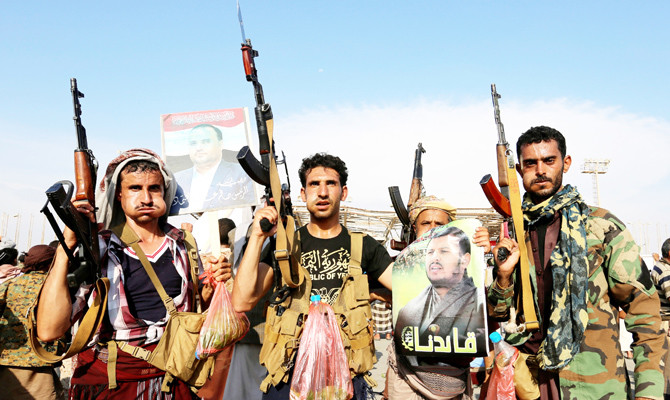DUBAI: Soon after Saleh Al-Sammad, one of the most senior Houthi officials, had been killed by a Saudi-led Arab coalition airstrike in Yemen, the militias announced that Mehdi Al-Mashat would take his place as head of the group’s so-called Supreme Political Council.
Al-Sammad’s death was revealed by Houthi leader Abdel-Malek Al-Houthi on Monday in a televised statement. He said Al-Sammad, the president of the Houthi-backed political body that runs most of northern Yemen, was killed last week in Hodeidah province.
He was second on the Saudi-led coalition’s most wanted list of Houthi leaders, after Abdel-Malek Al-Houthi himself. The coalition was offering a $20 million reward for any information leading to Al-Sammad’s capture.
His death dealt a heavy blow to the Iran-backed group, which sparked the war with the internationally recognized government of Abed Rabbo Mansour Hadi, after it seized the capital Sanaa in 2014, forcing the president to flee.
“It’s certainly a big hit — if more on a symbolic basis. Sammad was a key face of the Houthis,” Adam Baron, co-founder of the Sanaa Center For Strategic Studies, told Arab News.
Yemeni political analyst and former Nobel Peace Prize nominee Baraa Shiban also believes this to be a significant blow to the militant group.
“The entire Houthi movement depends highly on secrecy; that’s why for them the hit on Saleh Al-Sammad was big, because it means that they have been compromised to a high level,” Shiban told Arab News.
He said that the strike showed that the coalition had had some intelligence on his location before the attack.
The Houthi militias, similar to their Lebanese Shiite ally Hezbollah, pride themselves on the idea that no one can track their movements and that they have control of the flow of information through a tight inner circle, Shiban said.
Al-Mashat’s elevation to president of the political council, is being viewed as the latest attempt by the Houthis to keep power between a select few at the top of the group.
Al-Mashat was previously director of Abdel-Malek Al-Houthi’s office.
“It signals consolidation around close confidants of Abdel-Malek,” Baron said, “Al-Mashat is one of the more trusted members of his inner circle.”
Little is known about Al-Mashat. However, it is rumored that Mehdi Al-Mashat, the replacement of Saleh Al-Sammad, is related to the Houthi leader by marriage.
Local reports in Yemen have said Al-Mashat received training from the Iranian Revolutionary Guards and Hezbollah, but Arab News cannot independently confirm these reports.
Some have referred to Al-Mashat as a hard-liner who has been known to adopt aggressive positions.
Al-Mashat was reportedly one of the Houthi commanders who launched attacks in November 2013 on the town of Dammaj, in the northwestern province of Saudi Arabia. Residents said the Houthi militias used heavy weapons to shell their villages, killing dozens.
Al-Mashat’s name resurfaced in 2014, when he took part in several rounds of negotiations held between the Houthis and Yemeni political parties. Many remember Al-Mashat’s infamous aggressive behavior during the National Dialogue Conference, which formed part of the Yemeni crisis reconciliation efforts after the 2011 uprising.
Baraa, who was taking part in the dialogue, recalled that during intense talks at the Movenpick hotel with the former UN envoy Jamal Benomar, Al-Mashat pulled out his gun and put it on the table.
Baraa said Al-Mashat told the other Yemeni factions in the room: “For some people nothing works with them but bullets.”
While Al-Mashat is seen to be more aggressive than Al-Sammad, Yemeni analysts say they do not expect much difference in the militias approach because all the decisions are made by the Houthi leader.
“Both Al-Sammad and Al-Mashat are two sides of the same coin and both served the Houthi political leadership by being completely subservient to Abdel-Malek Al-Houthi,” Fatima Al-Asrar, senior analyst at the Arabia Foundation think tank, said. “No one else in the Houthi movement holds power besides Abdel-Malek and they both are not anything more than a mouthpiece of the political movement.”
The main difference between the two would be that Al-Sammad had a degree of acceptance among some tribes and political figures outside the Houthi group.
“He would not use a threatening tone with Yemeni tribes, he would try to reconcile with them. I don’t see Al-Mashat taking a similar approach,” Baraa said.
Despite Al-Mashat’s lack of diplomatic skills, he was appointed deputy head of the negotiating team during talks in Switzerland in 2015 and Kuwait in 2016.
In May last year, Al-Mashat was appointed as a member of the Supreme Political Council. The Council was set up by the Houthis after the collapse of the Kuwait talks to rule the territory under their control.
“The Houthis — with or without Al-Sammad — have proven that they are unable to build horizontal relationships with tribes in Yemen,” said Mohammed Al-Yahya, a senior fellow at the Gulf Research Center.
One of the people who is believed to have died with Al-Sammad was Fares Manaa — a top arms dealer in Yemen who was sanctioned by the UN and US, Al-Yahya said. The newly appointed UN special envoy for Yemen, Martin Griffiths, is trying to jump-start a new round of talks.
Earlier this month he made his first briefing to the Security Council where he stated that a “political solution to end this war is indeed available.”



























